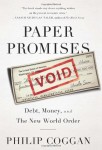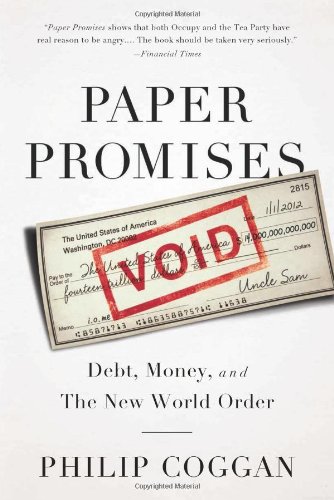[Paper] Videos
Winner of the Spear’s Best Business Book Award
Longlisted for the 2012 Financial Times and Goldman Sachs Business Book of the Year Award
For the past forty years western economies have splurged on debt. Now, as the reality dawns that many debts cannot be repaid, we find ourselves again in crisis. But the oncoming defaults have a time-worn place in our economic history. As with the crises in the 1930s and 1970s, governments will fall, currencies will lose their value, and new systems will emerge. Just as Britain set the terms of the international system in the nineteenth century, and America in the twentieth century, a new system will be set by today’s creditors in China and the Middle East. In the process, rich will be pitted against poor, young against old, public sector workers against taxpayers and one country against another.
In Paper Promises, Economist columnist Philip Coggan helps us to understand the origins of this mess and how it will affect the new global economy by explaining how our attitudes towards debt have changed throughout history, and how they may be about to change again.
“The book teems with eccentric characters and scenes that made my skin crawl…. Explained simply, read easily, Bad Paper defies expectations. It should also raise quite a few alarms.”-Colin Dwyer, NPR
The Federal Trade Commission receives more complaints about rogue debt collecting than it does about any activity besides identity theft. In Bad Paper, journalist Jake Halpern reveals why. He tells the story of Aaron Siegel, a former banking executive, and Brandon Wilson, a former armed robber, who become partners and go in quest of “paper”-the uncollected debts that are sold off by banks for pennies on the dollar. As Aaron and Brandon learn, the world of consumer debt collection is an unregulated shadowland, where operators often make unwarranted threats and even collect debts that are not theirs.
Introducing an unforgettable cast of characters, Halpern chronicles Aaron and Brandon’s lives as they manage high-pressure call centers, hunt for paper in Las Vegas casinos, and meet in parked cars to sell the social security numbers and account information of unsuspecting consumers. The result is a vital exposé on the cost of a system that compounds the troubles of hardworking Americans and an astonishing feat of storytelling.
An Amazon Best Book of the Month, October 2014: Everyone knows about collections agencies, but how they actually operate is much more interesting than you probably think. Falling somewhere between Glengarry Glen Ross and Mean Streets, Jake Halpern’s Bad Paper introduces us to an economy spanning many shades of gray. Halpern’s book tracks the descent of “paper” (spreadsheets containing the information of millions of debtors and their debts) as it’s sold for pennies on the dollar by banks and credit companies and passed through a network of collectors. Files are often bought and sold multiple times, each transaction stripping away the best remaining prospects as collectors wring paper dry through all manners of persuasion and coercion. Along the way, Halpern encounters first-hand the game’s players, from the financiers at the top of the pyramid to mid-level “brokers” and the ground-level phone-jockeys; these are all hard men within their contexts, as one tale of a Tarantino-grade stand-off over stolen information attests. This book is unexpected, and unexpectedly fun. –Jon Foro
A trip to the underworld of debt collection, where bankers team up with ex-burglars and few rules apply
Bad Paper is a riveting exposé, a moving story of an unlikely friendship, and a gritty narrative of how scrappy entrepreneurs profit from our debts. Jake Halpern introduces us to a former banking executive and a former armed robber who become partners and go in quest of “paper”—the uncollected debts that are sold off by banks for pennies on the dollar. As Halpern shows, the world of consumer debt collection is a wild and unregulated shadowland, where operators may misrepresent a debtor’s situation, make illegal threats, and even lay claim to debts that are not theirs to collect in the first place. It is a realm of indelible individuals who possess a swagger and vocabulary that even David Mamet could not invent. Halpern follows his collectors as they intimidate competitors with weapons, manage high-pressure call centers, and scheme new ways to benefit from American’s debt-industrial complex. He also explores the history of collection agencies and reveals the human cost of a system that leaves hardworking Americans with little opportunity to retire their debts in a reasonable way. The result is a bravura work of storytelling that is also an important consciousness-raiser.
Newly updated version of the classic book from Jimmy Napier.
Longlisted for the 2012 Financial Times and Goldman Sachs Business Book of the Year Award
For the past forty years western economies have splurged on debt. Now, the reality dawns that many debts cannot be repaid. But the oncoming defaults have a time-worn place in our economic history. As with crises in the 1930s and 1970s, governments will fall, currencies will lose their value, and new systems will emerge. Just as Britain set the terms of the international system in the nineteenth century, and America in the twentieth century, a new system will be set by today’s creditors in China and the Middle East. In the process, rich will be pitted against poor, young against old, public sector workers against taxpayers, and one country against another. To understand the origins of this mess and how it will affect the new global economy, Coggan shows us how our attitudes toward debt have changed throughout history?and how they may be about to change again.





